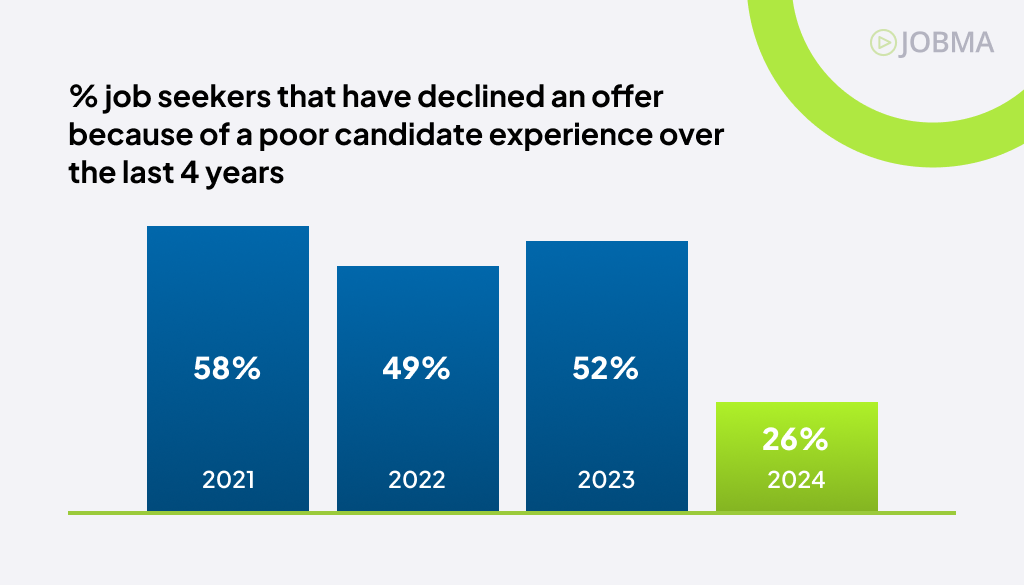Think Like a Candidate: A Recruiter’s Guide to an Exceptional Candidate Experience
A great candidate experience is pivotal in attracting and retaining top talent, no matter the market landscape. According to the recent candidate experience report by CareerPlug, 1 in 4 candidates declined a job offer due to a poor experience. Every interaction a candidate has with your organization, from the initial job posting to the final offer, shapes their perception of your company.

Source: CareerPlug
When candidates feel respected, informed, and valued, they’re far more likely to stay engaged, accept an offer, and even recommend your organization to others. A poorly managed process filled with delays, confusion, or a lack of communication can alienate strong candidates and damage your reputation.
Defining Candidate Experience
Candidate experience encompasses the entire journey a job seeker undergoes during the recruitment process. This includes:
- How candidates find open roles and what they think of your job postings. Do they find the listings clear, compelling, and accessible, so the candidates understand the opportunity and whether it aligns with their skills and goals?
- The ease of applying for a job. Is the process intuitive and quick, so it minimizes drop-offs and ensures a positive first impression?
- The consistency, tone, and transparency of updates provided by the hiring team. Are the candidates getting prompt replies, interview confirmations, and progress updates to keep them informed and engaged?
- The professionalism, structure, and flexibility of the interview process. Whether virtual or in-person, are the interviews respectful of a candidate’s time and designed to let them showcase their abilities?
- How decisions are communicated to the candidates, whether selected or not. Is the feedback timely, professional, and constructive to leave the candidates with a sense of closure?
Each of these touchpoints contributes to the overall impression candidates form about your organization.
Why is Candidate Experience Important?
Candidate experience has a direct impact on recruitment success and organizational reputation. 66% of candidates say a positive experience influenced their decision to accept a job offer.

72% of candidates have shared their negative experience through review websites (like Glassdoor) or with someone directly. Out of these, nearly 28% of employers have never read these reviews. Poor experiences lead to high applicant drop-offs, declined offers, and negative reviews that can ripple across professional networks and platforms. In contrast, positive experience fosters loyalty, encourages referrals, and even turns rejected candidates into advocates when highlighted through tools like video testimonial software.
Key reasons it matters:
- Candidate retention through the hiring process: Candidates are more likely to stick with a hiring journey when they feel acknowledged and informed. This is especially important for competitive roles with multi-stage interviews, like Developers, Managerial Leadership roles, Customer Service Executives, etc. Recent surveys show that over 28% of job seekers would like to see employers prioritize clear and accurate information about the job and responsibilities.
- Stronger employer branding: Every interaction reinforces your employer brand. Every positive interaction sends the message that your organization is structured, empathetic, and employee-focused. Even candidates who don’t receive an offer often speak positively about the company if their experience was prioritized throughout the process.
- Higher quality hires: When the experience feels efficient and professional, candidates are more inclined to say yes to your job offer, and those who accept are typically more enthusiastic and committed. In the past few decades, researchers have recognized the direct relationship between candidate experience and quality of hires. Top performers often have multiple options, and a candidate-focused process can help you become the top preference.
- Operational efficiency: A structured, candidate-focused process allows recruiting teams to focus on the right leads rather than backtracking to re-engage candidates who’ve lost interest. Using lead nurturing emails can keep potential candidates engaged and informed throughout the recruitment journey. The result? Fewer miscommunications and less time wasted on follow-ups, allowing your team to work smarter and faster. Implementing lead routing ensures that each candidate is directed to the appropriate recruiter based on skills, role, or location, optimizing the workflow and improving the overall hiring experience.

How to Leverage Technology to Ensure a Quality Candidate Experience
1. Matching the Right Candidates to the Right Roles
Relevance is key to candidate experience. AI-powered Job Description-to-Resume matching ensures recruiters only contact candidates whose skills and career background closely align with the job description. This means fewer mismatched job invites, more time saved for shortlisting candidates, and high-quality hires. Candidates no longer feel like they’re part of a bulk outreach campaign, but rather selected based on merit.

To get this right:
- Prioritize quality over quantity in outreach.
- Make sure job criteria are clearly defined.
- Aim to review profiles for more than just technical fit, look at soft skills, experience level, and growth potential.
When a candidate sees a job that fits their background and interests, they’re more likely to respond, stay engaged, and carry a positive impression of your brand.
2. Candidate-Friendly Communication Options
The first message you send to a candidate says a lot about your company. Multi-channel availability, through email, SMS, and open-link invites, shows adaptability and respect for individual communication preferences. These multi-channel invite options improve response rates and reduce drop-offs. And if you’re building your candidate database from scratch or trying to reconnect with past applicants, tools that offer phone number lookup free can help you quickly find accurate contact details and ensure your outreach reaches the right people.
Implementing recruitment tools that make cross channel communication accessible with one click can help you succeed in the competitive talent marketplace.
Here’s why it works:
- SMS has a 98% open rate (Sender), far higher than email.
- Personalized invites via email foster a stronger brand perception.
- Open links allow for efficient bulk outreach in job fairs or internal mobility campaigns.
Giving candidates choices in how they’re invited respects their time and preferences, a major component of a good experience. Using bulk SMS services makes it easy to reach large groups of candidates quickly, ensuring your message gets in front of the right people.
3. Keeping Candidates Informed at Every Step
Automated reminders and real-time notifications, both for candidates and recruiters, help keep the process on track. AI-powered hiring platforms like Jobma let you configure when and how often automated interview reminders should go out, creating a structured and timely candidate journey. According to CareerArc, candidates who are not informed about their application are 3.5x less likely to re-apply with the same organization in the future.
Here’s how to build that structure and prevent last-minute cancellations, no-shows, and miscommunications on schedules:
- Send confirmation emails after major milestones.
- Set up timely emails and reminders for interviews or tasks.
- Share updates regularly, even a “we’re still reviewing” message makes a difference for the candidate.
Using automated scheduling tools is crucial to decrease candidate drop-offs, and staying on top of communication equals respect for the candidate’s time.
4. Messaging That Builds Lasting Impressions
Welcome messages set expectations and tone, while thank-you notes leave candidates feeling appreciated and engaged, whether they get the job or not. So, it is important for teams to automate these messages while still personalizing them. 68% of candidates say the way they are treated during the hiring process reflects how the company treats employees (CareerBuilder).
Effective messaging doesn’t need to be elaborate. It needs to be intentional. Implementing WhatsApp Marketing Automation can help ensure your messaging remains consistent and timely, enhancing overall engagement.
Consider implementing smart hiring tools that allow:
- Including a personalized welcome message at the beginning of the interview, outlining the next steps.
- Adding encouraging notes and slides between assessments to maintain momentum.
- Sending engaging, automated, and timely rejection emails that offer closure.
5. Make Interviews Accessible and Efficient
Interviews are one of the most stressful parts of job hunting. The best thing you can do is make them as smooth and candidate-friendly as possible. Offering flexible formats, like live video, pre-recorded video interviews, or panel interviews, gives candidates a chance to present themselves on their terms.
For example:
- Pre-recorded video interviews allow candidates to answer questions on their own schedule.
- Live sessions offer space for real conversation and follow-up between the interviewer and interviewee without being present in the same room.
- AI-assisted live interviews help get deeper insights into the candidate’s skills while keeping the interview engaging and consistent.
By removing unnecessary hurdles like rigid scheduling or unclear expectations, you allow candidates to focus on what matters: showing you who they are and what they can bring to the team. It’s also a signal that your organization respects their time and has an open mind towards the hiring process.
6. Access Anywhere, Anytime
Gen-Z is moving towards a mobile-first job application experience. They want the flexibility to review job options during their commute, record interviews at night, or read updates on their lunch break. So, it is imperative that your hiring process is versatile and offers cross-device compatibility. Every part of the process, from application to interview, should work smoothly, whether it’s done on a phone, tablet, or laptop.
To ensure this:
- Use platforms that support resume uploads and taking interviews on mobile.
- You can use an AI App Builder to create a native mobile app for taking applications and communicating to candidates.
- Leveraging a mobile app intelligence platform can help track candidate engagement and improve the overall hiring process. Leveraging a mobile app intelligence platform can help track candidate engagement and improve the overall hiring process.
- Test your process on multiple screen sizes and browsers so that the candidate experience remains consistent across devices.
- Avoid formats that require heavy bandwidth or complicated configuration to run an interview.
A flexible system shows you’re thinking about the candidate’s experience and are willing to make the process easier for them. Working with a mobile app development company can help create user-friendly solutions that make this flexibility seamless and efficient.
Candidate Experience Best Practices
Be Transparent and Available
Set expectations clearly from the start. Inform candidates of timelines, interview formats, and who they’ll be speaking with. Transparency builds trust, and availability reassures candidates that their concerns will be heard. Provide a contact person for queries and make it easy for candidates to reach out. Whether through chat, email, or a dedicated FAQ page, being accessible helps ease candidate anxiety.
Be Tech-Forward
Being tech-forward can help you remove barriers in the hiring process. Platforms like Jobma help deliver a frictionless process with tools like AI-matching, video interviews, and automated scheduling. These features streamline the journey without sacrificing the human touch. This signals that your organization values efficiency and innovation. Ensuring mobile access and self-service scheduling, and integrating with ATS platforms for smoother workflows, can set you up as a top choice for job seekers.
Personalized Communication
Personalized communication doesn’t just improve response rates, it builds a relationship. No one wants to feel like applicant #457. Use names, job roles, and context in your emails, reference the candidate’s resume or experience, and segment your messaging based on where they are in the pipeline. Personalization shows you’ve taken time to understand their background and that you care enough to tailor the message. To ensure your personalized communication reaches the recipient’s inbox, consider utilizing email deliverability tools to optimize your message delivery.
Clear Hiring Process and Expectations
Lay out what to expect: number of interview rounds, who will be present, and when feedback will be shared. This reduces anxiety and positions your company as organized and respectful. Make sure to be transparent about expected interview timelines, the decision-making criteria you follow, and the feedback process. Clarity in the hiring journey builds candidate confidence.
Provide Timely Updates and Feedback
Candidates want to know where they stand, even if the answer is no. Offering feedback, even brief insights, demonstrates professionalism. It is important to share status updates after every stage, offer constructive feedback when rejecting candidates, and be open to feedback to refine your hiring process. Being timely and honest creates brand trust and keeps the candidate experience positive.
Endnotes
Candidate experience isn’t just a recruitment trend, it’s a competitive differentiator. In today’s fast-paced, tech-driven hiring environment, companies that prioritize how candidates feel during the hiring process will consistently attract better talent and build stronger employer brands.

Every stage of the process, including how you match, message, interview, and support candidates, sends a signal about your company’s values. When candidates feel respected, informed, and empowered, they’re more likely to complete the process, refer others, and return in the future, even if they’re not selected.
As hiring platforms continue to evolve, recruiters must be tech-ready. By aligning tools with thoughtful strategy and consistently putting candidate experience at the center, you build a talent pipeline that’s enthusiastic, diverse, and resilient.




